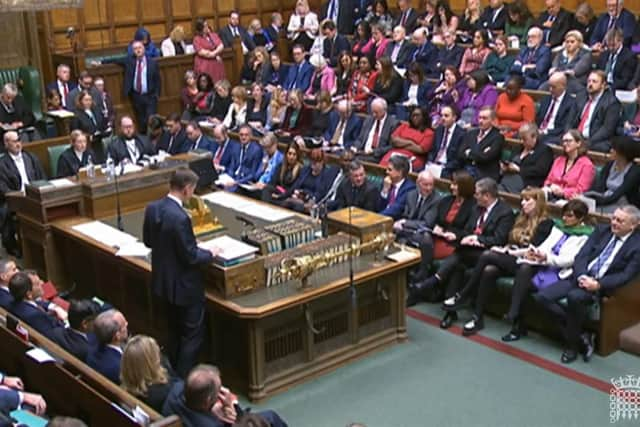Autumn Statement: How today's mini budget will affect your pocket
Inflation hit 11.1 per cent yesterday - its highest in 41 years, putting additional strain on the chancellor ahead of the budget.
Fuel bills and food prices continue to be the biggest driving factors behind the inflation.
Advertisement
Hide AdAdvertisement
Hide AdAhead of the budget, a wide range of organisations laid out their case for additional funding, including NHS and care groups, local councils, pensioner organisations and charities.


Today, chancellor Jeremy Hunt said the headwinds being faced in the UK were “unprecedented”, but that the economic downturn would be “shallower” than it would have been without the interventions in the budget.
But, he said, the Office for Budget Responsibility estimates the UK is already in recession.
The Yorkshire Post has taken a look at what today’s budget means for different groups of society.
Earnings
Advertisement
Hide AdAdvertisement
Hide AdThe top rate of income tax - 45 per cent, will now be paid on all earnings over £125,140, rather than £150,000 currently.
The national insurance and inheritance tax thresholds have been frozen for another two years, until April 2028.
Tax-free allowances for dividend and capital gains taxes will be cut next year and the year.
The chancellor has accepted a recommendation to increase the national living wage by 9.7 per cent, meaning the hourly rate would be £10.42 from April next year, the largest rise in history.
Pensions
Advertisement
Hide AdAdvertisement
Hide AdThe chancellor said the cost of living crisis is hurting not just the poorest pensioners, but all pensioners, so the pension triple lock would be maintained, meaning pensions will rise by last month’s inflation figure of 10.1 per cent next year.
He also said he would be lifting pension credit - available to pensioners with the least money, by the same amount.
Energy bills
The cap on average energy bill prices will rise to £3,000 from £2,500 from April next year, the chancellor said, but more protection will be available for those struggling to pay.
He said by 2030 the Government wants to reduce energy consumption from buildings and industry by 15 per cent, adding this could – according to today’s prices – save £28 billion from our national energy bill or £450 off the average household bill
Benefits
Advertisement
Hide AdAdvertisement
Hide AdAlong with pensions, benefits was one of the key issues facing the chancellor ahead of the budget.
In a move he said would cost around £11 billion, Mr Hunt announced that like pensions, benefits would be linked with inflation next year, meaning a 10.1 per cent increase.
Additional funding would also be available to help more people back into work, he said, because employment levels have yet to return to pre-pandemic levels.
Further, he said additional cost of living payments for the most vulnerable: £900 for people on benefits; £300 for pensioners and £150 for anyone in receipt of a disability benefit.
Advertisement
Hide AdAdvertisement
Hide AdRent increases in the social housing sector would also be capped at seven per cent, rather than the 11.1 percent of inflation.
Healthcare
Funding for the NHS and social care would keep up with inflation, the chancellor said, with additional new funding of £3.3 bn in each of the next two years.
On staff shortages in the health sector, he said the Department for Health and Social Care and the NHS would publish an independently-analysed plan looking at how many doctors and nurses would be needed in five, 10 and 15 years time.
He said additional grant funding of £1 billion from next year and £1.7 billion the year after would be made available for social care, delivering 200,000 new care packages over the next two years.
Advertisement
Hide AdAdvertisement
Hide AdOn the NHS, he said efficiency savings alone would not be enough to meet the financial challenges, hence the need for the additional £3.3bn in annual funding.
Savings
The annual exempt amount for capital gains tax will be cut from £12,300 this year to £6,000 next year.
Electric vehicles
Electric vehicles will no longer be exempt from vehicle excise duty from April 2025, to make the motoring tax system “fairer”, the Chancellor said.
New house buyers
The stamp duty cuts paid by house buyers, announced in the mini budget by Kwasi Kwarteng, will remain in place but only until March 2025, earlier than expected.
Windfall tax
A windfall tax on oil and gas companies will be significantly extended. It will be increased from 25 per cent to 35 per cent next year, as well as a new 45 per cent levy on electricity generators.
Comment Guidelines
National World encourages reader discussion on our stories. User feedback, insights and back-and-forth exchanges add a rich layer of context to reporting. Please review our Community Guidelines before commenting.
